- Home
- Christopher Moore
Noir Page 4
Noir Read online
Page 4
Anyway, one morning, two years or so ago, I stumble in around 7 a.m., having indulged perhaps more than recommended in the consumption of spirits and the construction of merriment, when I encounter the kid on the stairs as he is heading out for school. So I says to him, “Look, kid, my alarm clock is on the bum, and I feel that I may be sleeping more than somewhat soundly today, as I am very tired. I need to make it to work at four this afternoon, so I’ll give you two bits if you come up and wake me up when you get off from school, and do not leave until I am on my feet.”
Actually, my alarm clock is not on the bum, but I have been known to fling said clocks crashing to alarm-clock Valhalla upon a certain morning after I have indulged in spirits, and since I am new on the job at Sal’s, and it is soon after the war ends and jobs are in quite short supply, I need to make my punch-in time.
Well, the kid takes this as a permanent assignment, and from that day unto this, hits me up for two bits a day for waking me up, as well as taking messages, screening visitors, coaching me on the heavy bag, and casting aspersions on the occasional lady friend who joins me for a sleepover, saying “tramp” and “floozie” to them as they leave in the morning, when they are at their most vulnerable. So, even though the kid is horrible, he is almost an orphan, what with his pop deceased and his mother practicing her athletic pursuits, and I do not have the heart to tell him that the two bits for waking me up is a onetime thing that he has misinterpreted. I don’t remember ever giving the kid a key, but evidently I did, and he refuses to give it back. Ever.
“C’mon,” says the kid, whacking the heavy bag with his dirty little dukes. “What are you, some kind of cream puff? Give me twenty good minutes on this thing, and don’t spare the gas.”
“What’s the message, runt?”
“Why, I’ll bet my uncle Davey could take you out in the first round, ya macaroon.”
“A macaroon is a cookie, kid.”
“No it ain’t. You’re a dirty liar.”
“What’s the message, and who’s it from?”
“It’s from that Nip cocksucker with the black-and-white shoes.”
“Don’t talk like that.”
“What? Nip is just Nip for ‘Jap.’”
“I meant the other thing. And he’s Chinese, not Japanese. What’s the message?”
“He said to tell you like this: ‘The Cheese is a biscuit-slinger at the five-and-dime on Polk.’ What is that, some kind of Nip code? Why, my old man would have just popped that Jap cocksucker right on the spot, if he wasn’t dead.”
“Yeah, I’m sure he would,” I says, not really paying attention anymore. Why would Eddie drop by to tell me such a thing in the middle of the day? I am surprised, in fact, that he is even awake at such an hour, but why couldn’t it wait? Maybe he feels bad about dragging me into that joint where I am invited to sip snake whiz and touch an old Chinaman’s dong, so he wants to make amends. What Moo doesn’t know is that no amends are required, as I already have an angle on the snake whiz place which will make us a small fortune. Maybe.
“I’m telling you, that guy is a Jap spy,” says the kid. “He couldn’t even say ‘squirrel.’ That’s how they spotted spies in the war, if they can’t say ‘squirrel,’ you blast ’em.”
“That’s Germans that can’t say ‘squirrel.’”
“Yeah, well, he wouldn’t say it, no matter how much I threatened him. What’s that tell you?”
“That you’re a pest?”
“Yeah, what do you know, ya bum? Sleeping till noon.”
“I’m supposed to be sleeping until three, and I do not appreciate you giving my pals the third degree.”
Then the kid gives the heavy bag one last whack and pads over to my bedside with his hand out. “Pay up. Two bits for the message and two bits for the wake-up.”
“You’ll get nothing and you’ll like it,” I says. “Did you make coffee?”
“No. Pay up.”
So I sit up in bed, reach down, and grab his little run-down shoes from the floor. “Take these and get out.”
And the kid snatches the shoes from me and heads out.
“Fine, you welsher. You know, if I’da known you were going to welsh on my wages I wouldn’t have woken you up. I ain’t even going to tell you what I heard on the radio.”
“Don’t use my radio,” I tell him.
“Fine, I ain’t even going to tell you that a guy saw a flying saucer up by Mount Rainy in Washington.”
“Mount Rainier,” I tell him.
“No it ain’t,” says the kid. “You don’t know. You weren’t even listening. Probably Martians.”
“There’s no such thing as Martians, kid.”
“Yeah there is. They’re coming to take our dames. You’re a stinkin’ liar.”
“Fine,” I says. “Go away.”
“Fine,” says the kid, hand on the doorknob. “I’m gonna go see that Bogey movie, and I ain’t gonna tell you a stinkin’ thing about it. You can just suffer, ya Nip sympathizer.”
“Go,” I says.
“I’m going,” he says. “You can just sleep in and eat a pile of fish heads when you wake up.”
“Fine!” says I.
“Fine!” says the kid, stepping into the hall. “And you’re out of milk.”
I keep some milk and cornflakes and bread and butter and stuff in the apartment in case the kid gets hungry.
“Fine!” I says.
“Fine!” says the kid. And he slams the door.
I still have a few hours to sleep, and I can probably wake up to the alarm clock, so I have a quick whiz and return to bed with a towel to drape over my eyes against the unkind light of day. When I set the alarm clock I tell it, “Sorry, pal, but this afternoon you may die for that little fucker’s sins.”
* * *
So I’m forty minutes walking to work because I go a mile out of my way to walk past the five-and-dime on Polk Street, which is not along the route of my normal, three-block sojourn to Sal’s. I just walk by, and I can see there’s a dame working the lunch counter, but she is not by any stretch the Cheese, as she is red of hair and more than somewhat plain. Just the same I walk the whole block without giving in to my limp, and I hold my walking stick like I’m a guy in a hurry, carrying an umbrella on a sunny day, or perhaps a deer slayer padding through the forest with his bow in hand.
Do I stop in and ask after Stilton to the red-haired dame? I do not.
Do I leave word that Sammy from Sal’s stops by and please tell Stilton best wishes? I do not.
I just walk by, and as I go, I am thinking that I am a first-rate sap.
What am I, nine years old?
I ask, because I know this feeling. See, when I am nine, little more than a child myself, I fall in deepest, darkest love with a little doll called Molly Warner, who is in my third-grade class and has a most fetching brown bob hairdo, as well as a facility with long division, which I find, at the time, borders on the mystical. I am smitten to the deep end of my soul, and I express my love, first by writing the aforementioned doll’s name on little pieces of paper and eating them during class, and later, when I find out where she lives, by walking past her house four to five times a day with my brow knitted in concentration, maybe anger, as I have convinced myself that I am at my most dashing when my brow is knitted in a Douglas Fairbanks manner. (The knitted brow being my fallback position on dashing after several days of concentrated pencil-thin-mustache growing ends in despair.)
Anyway, at the time, we live about a mile outside of Boise, down a little cul-de-sac off Marston Road, and Molly lives in a big white house halfway into town on the same road, so I have to do quite some walking to pass by her house repeatedly, and the only place my mother allows me to go, unless she sends me to the store for this or that, is the library. So, in hopes of being spotted by Molly Warner, I construct emergencies of a literary nature, that can only be solved by a new book, which very much delights my mother, the English teacher, who is quite busy taking care of my father, two brot
hers, and one sister, all while teaching English and preparing for the Great Depression, which is nigh upon us.
Well, on none of my many, many walks do I ever spot the magical Molly, but I am sure that from behind closed curtains she sees me and my brow, as tightly knitted as a store-bought sweater, and I am more than somewhat convinced that she has spurned me and broken my heart, although I have not worked up the nerve to even talk to her. But in the meantime I have read through all the cowboy, pirate, and jungle boy novels the library has to offer in my reading level, and have, in fact, progressed to reading all the novels of Mr. Mark Twain, Mr. Jack London, Mr. Edgar Rice Burroughs, and beyond, until by the time my heart is sorely broken I am able to comment upon Dostoevsky’s Crime and Punishment while shooting marbles and catching frogs, which enriches those activities not at all.
Anyway, third grade passes into fourth and I have developed into a brilliant and melancholy little guy, and while I am still slow to screw up my courage to approach Molly, I am sure the next day will always be the day I will say something, and she will fall into my arms, and we will go off to live in the jungle together in a tree house with just the apes and the elephants and maybe the occasional leopard, which I will kill with a knife to impress her. But one day, in the summer, as I am making an extra trip to the library, I see a moving van outside her house, and before I am able to say anything, she is gone. Moved away. Forever. One more day and I would have said something. The next time I saw her, I am certain, I would have. I am still certain.
Which is exactly how I now feel as I walk past the five-and-dime and don’t so much as pause to look at the key chains, let alone ask after Stilton. And then I realize why Eddie Moo Shoes sends me this message. He thinks that Stilton is my Lois Fong, and although there is little reason, beyond her being easy on the eyes and exhibiting no little moxie, for me to have designs on the Cheese, I am hooked, caught, doomed—in short, he thinks I am a sap just like him. And I am.
But the next time I see her, if I see her, I will not let her get away. The next time for sure. Or perhaps I will join the seminary. After the Molly Warner catastrophe I contemplated becoming a monk and even wrote to a seminary in Chicago to ask them to take me to live a quiet life of spiritual despair, but I never heard from them, the bums.
* * *
“Dog pizza,” said Sal, first thing when I walked in. He was wearing a black apron, a bow tie, and a white shirt with garters on the sleeves, looking like the type of bartender who gets shot in westerns.
Sal’s is the kind of joint where when you open the door in the afternoon everyone looks up like rats caught in a spotlight eating the brains of a friend dead in a trap. No one is happy to be caught in a bar at four in the afternoon. Even the old alkies who migrate through the neighborhood in the morning to meet a shot already set up for them when Sal opens are a little ashamed; they growl at the light like Frankenstein at fire. Sal wiped down the bar with a tattered rag like he was mopping up blood from a fresh ax murder, listless, like he knew he was just stirring the gore on the surface. I cleaned up when he left.
“Dog pizza?” I said. It sounded like something Moo Shoes might bring up trying to throw me a curve. Yeah, my people have been eating dog pizza for a thousand years. It makes your willie wag like a puppy’s tail. Try a slice. Fucking Moo Shoes.
“Have I mentioned that my people are from Napoli?” asked Sal.
“You might have.” Only about eight thousand fucking times.
“Well,” said Sal, “it is a well-known fact that pizza is invented in Naples, as well as pasta—”
“And the douche bag,” I said.
“Really? I never hear that,” said Sal.
“Yeah,” said I, spinning up the engines. “In fact, when Leonardo da Vinci is in Naples he does the first early drawings of the douche bag. Naples is to douche bags what Kitty Hawk is to airplanes.”
“Yeah, well, I did not know that, but from now on I will add it to my story. Anyway, perhaps you have noticed that since the war, with all the guys coming home and getting married and trying to raise families, and with all the apartments in the city filled with citizens who come here to work in munitions factories and shipyards, new houses with yards are being built out in the Sunset District for these new families, so suddenly there is a preponderance of pets in the city.”
“A preponderance?”
“Yeah, it means a shitload. Anyways, when I am at the store picking up coffee for me and the old lady, I notice that a guy can not only buy several kinds of dog and cat food, but also pet snacks, like doggie donuts and kitty crullers.”
“You don’t say?” I said.
“And then I am thinking, maybe if a guy can get an angle on that market, there is a sizable fortune to be made. So first I think, I am an expert in procuring and distributing certain beverages, so I think that perhaps a line of dog and cat spirits might work.”
“But no?” I guessed. Sal made the money to buy the bar during Prohibition, procuring and distributing certain beverages for very high profit due to their illegal nature, and since repeal he’d been searching for a new angle on that business. During the war he did quite well for himself by watering drinks and selling servicemen liquor at very steep markup during off-limits and curfew hours, but since the Japs surrendered, business declined more than somewhat.
“It turns out that dogs and cats do not care for liquor at all, but prefer licking their own balls to even the best bourbon.”
“You do this experiment yourself?” I asked. I was checking my back bar and my kegs before I started my shift. As usual, Sal had restocked nothing at all.
“There are some dogs who sometimes frequent the trash barrels out back, and I put a saucer down with some prime Kentucky goof juice to draw them in. But they stay away at some distance, variously scratching and licking their private parts with great enthusiasm. So I am thinking, perhaps they need to have a taste first, then they will take to drinking, so to draw them in, I grab a piece of pizza left over from my lunch, which I pick up at Napolitano’s down the street. And soon they are all gathered around, quite interested, as I tear off pieces of pizza and toss some to each mutt in turn, but even when I shove one’s nose into the bourbon, the mutt is not interested. Then it comes to me, what I am missing the point of, even if it is right there in my face . . .” Here he paused for dramatic effect.
And I, as has often been the case, did not shut up, as would have been prudent. “You tasted dog balls to see why they were so delicious?”
Sal scowled at me as he said, “No, smart-ass, I realize that what I need to do is make pizzas just for dogs. Little ones. Put them in boxes, and sell them to all the new families with their new dogs all over the new suburbs.”
“Well, it sounds as if you have found your angle, boss,” I said. “Dog pizza in a box. Can’t miss.”
“I was thinking Sal’s Dog Pizza,” said Sal. “But it doesn’t have a ring like Doggie Donuts or Kitty Crullers.”
“I could work on the name for you,” I offered. Now I just wanted Sal to get out of the saloon so my afternoon regulars would come in. I could see a few had peeked in only to take a walk when they saw Sal still around. “I wrote a lot of poems when I was a kid.”
“Nah, I’ll figure it,” said Sal. “I need you to work on that other thing for the general.”
“About that,” I said. “I am not sure how, exactly, to go about such a task of finding a whole gaggle of young, single dames who will want to keep the company of rich old guys up in the redwoods.”
“Well, you will offer them plenty of cheddar, is how,” said Sal. “The general assures me this is no problem.”
“But why does he not just hire professionals?”
“Because muckety-mucks such as belong to the Bohemian Club wish to be appreciated for their charm and dignity and whatnot, and do not wish to feel that they have to stoop to paying for some tail. And furthermore, the general, who has worked himself up from being a grunt airman in the Army Air Corps to commanding a base som
ewhere in the middle of New Mexico, wishes to become a Bohemian, which he can only do if they invite him, and despite his rank and his medals, they do not, so he wants the Bohemians to owe him a favor.”
“I see,” I said, which I saw last night after overhearing them. Although I do not see why a guy who has worked his way up to being a general cares about being in a club that does not want him, unless that is the reason itself. The Bohemians were a fixture in San Francisco for quite a long time, and there was no little mystery about what went on at their camp up in the redwoods a couple of hours north of the city, but rumor was that very powerful guys from all walks of life gathered there to come up with some very influential capers having to do with running the world, such as the Manhattan Project and the New Deal and whatnot. It seemed that they had as members most of the last dozen or so presidents, as well as captains of industry and the odd artist or writer, which they kept around so their name wasn’t completely phony. But why guys with that kind of weight cannot procure their own female company, I cannot figure. “How does this task fall to you?” I asked.
“It falls in my lap by sheer luck,” said Sal. “Last night, Tony Cannelloni, who is a legacy member, invites me into the city branch of the club on Taylor Street. In the twenties I get liquor for the club, so I am well regarded by one and all. So we are in there, smoking cigars, and it is all very leather wingback chairs and dark wood paneling and whatnot, and in comes the general with another member, a guy who I think is a lawyer called Alton Stoddard the Third, who drops the general in our laps for safekeeping while he goes off to the can or something. Soon we get to chatting, and when Tony Cannelloni goes over to say hi to some other mook, the general reveals that he is only a guest, but he has been invited to the big to-do up at the camp next week, and he very much wants to be a full Bohemian, but he can’t find an angle. So we talk about this and that, and he realizes that I am no little connected in the San Francisco community, so he appeals to my expertise. ‘I need to bring something to the club they cannot otherwise procure,’ he says. And this leads to that and up comes the plan to bring the regular Bettys, and he hires me to do the dirty work, which I accept with vigor, as I need a fresh pull with the Bohemians, as they can be a very large source of filthy lucre for those of us in the entertainment business.”

 Lamb: The Gospel According to Biff, Christs Childhood Pal
Lamb: The Gospel According to Biff, Christs Childhood Pal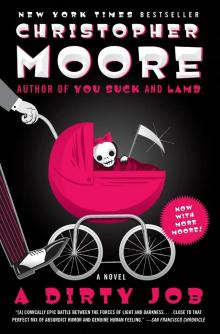 A Dirty Job
A Dirty Job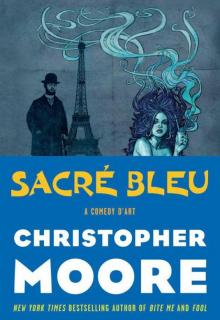 Sacré Bleu
Sacré Bleu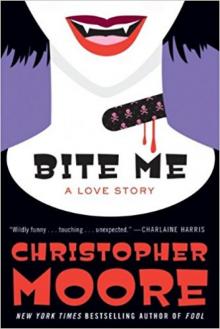 Bite Me: A Love Story
Bite Me: A Love Story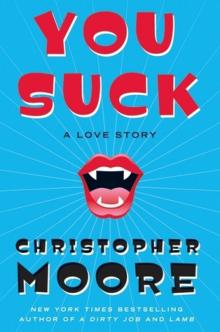 You Suck: A Love Story
You Suck: A Love Story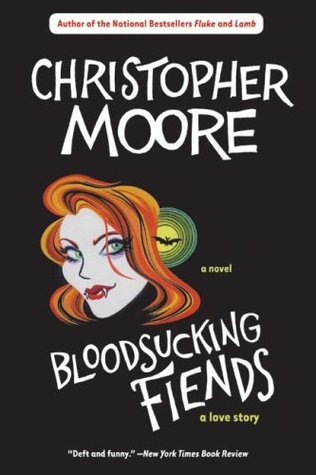 Bloodsucking Fiends: A Love Story
Bloodsucking Fiends: A Love Story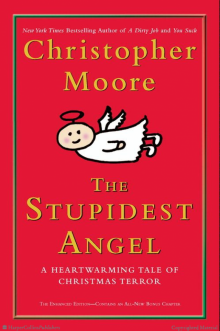 The Stupidest Angel
The Stupidest Angel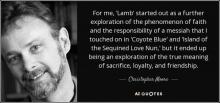 Coyote Blue
Coyote Blue The Lust Lizard of Melancholy Cove
The Lust Lizard of Melancholy Cove Secondhand Souls
Secondhand Souls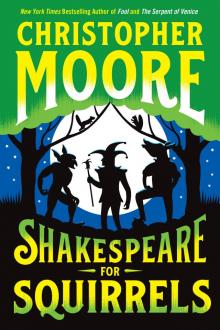 Shakespeare for Squirrels
Shakespeare for Squirrels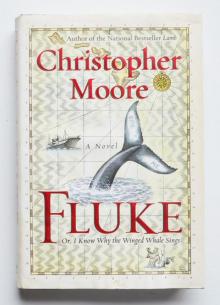 Fluke, or, I Know Why the Winged Whale Sings
Fluke, or, I Know Why the Winged Whale Sings Island of the Sequined Love Nun
Island of the Sequined Love Nun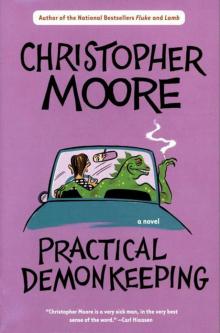 Practical Demonkeeping
Practical Demonkeeping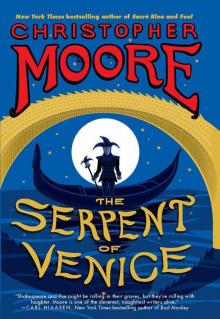 The Serpent of Venice
The Serpent of Venice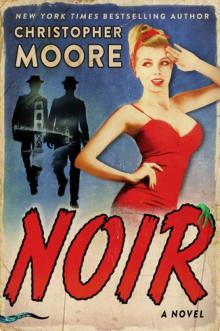 Noir
Noir Lamb: The Gospel According to Biff, Christ’s Childhood Pal
Lamb: The Gospel According to Biff, Christ’s Childhood Pal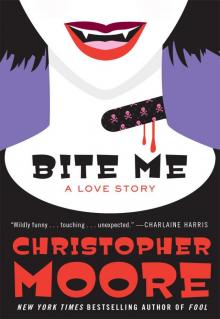 Bite Me
Bite Me Bloodsucking Fiends
Bloodsucking Fiends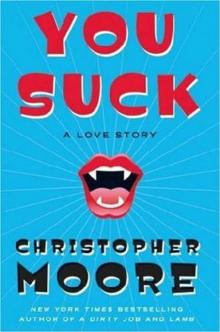 You Suck ls-2
You Suck ls-2 Bloodsucking Fiends ls-1
Bloodsucking Fiends ls-1 The Stupidest Angel: A Heartwarming Tale of Christmas Terror
The Stupidest Angel: A Heartwarming Tale of Christmas Terror The Lust Lizard of Melancholy Cove pc-2
The Lust Lizard of Melancholy Cove pc-2 You Suck
You Suck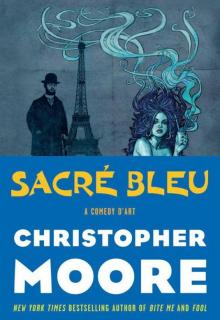 Sacre Bleu: A Comedy d'Art
Sacre Bleu: A Comedy d'Art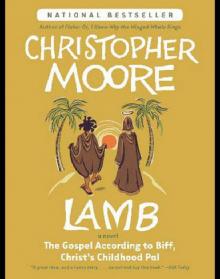 Lamb
Lamb 1867
1867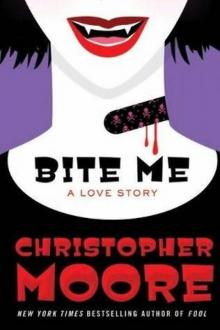 Bite Me ls-3
Bite Me ls-3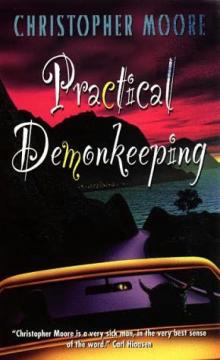 Practical Demonkeeping pc-1
Practical Demonkeeping pc-1